
Related
Guests
- Asmer Safisenior at Harvard College and one of 13 pro-Palestinian student protesters barred from graduating.
- Alison Frank Johnsonprofessor of history at Harvard University.
More than a thousand Harvard students walked out of their commencement ceremony yesterday to support 13 undergraduates who were barred from graduating after they participated in the Gaza solidarity encampment in Harvard Yard. Asmer Safi, one of the 13 pro-Palestinian student protesters barred from graduating, says that while his future has been thrown into uncertainty while he is on probation, he has no regrets about standing up for Palestinian rights. “This is an ethical stance that we’re taking,” Safi says. We also hear from history professor Alison Frank Johnson, one of over 100 faculty members who voted to confer degrees on the 13 seniors, who describes Harvard’s punishment of them as an “egregious departure from past precedent,” as was the board’s subsequent overruling of faculty. “We hoped then that the Corporation, as it has always done in the past, would accept our recommendations for degree recipients and allow the 13 to graduate, which they chose not to do.”
Transcript
AMY GOODMAN: This is Democracy Now! I’m Amy Goodman.
More than a thousand Harvard students walked out of their commencement yesterday to support 13 undergraduates who were barred from graduating after they participated in the Gaza solidarity encampment in Harvard Yard. The students left in a long, slow procession as many chanted “Let them walk,” while others carried Palestinian flags.
HARVARD STUDENTS: Let them walk! Let them walk! Let them walk! Let them walk! Let them walk!
AMY GOODMAN: The students walked out of the graduation and went to a nearby church to host a “People’s Commencement” ceremony to honor the 13 undergrads denied their Harvard diplomas.
Meanwhile, this is Harvard University senior Shruthi Kumar, who went off script as she gave the English commencement address, slamming Harvard for denying the degrees. She read from notes that she pulled out of her graduation gown.
SHRUTHI KUMAR: In the fall, my name and identity, alongside other Black and Brown students at Harvard, was publicly targeted. For many of us students of color, doxxing left our jobs uncertain, our safety uncertain. This semester, our freedom of speech and our expressions of solidarity became punishable, leaving our graduations uncertain. As I stand before you today, I must take a moment to recognize my peers, the 13 undergraduates — the 13 — the 13 undergraduates in the class of 2024 who will not graduate today.
STUDENTS: Shame!
SHRUTHI KUMAR: I am deeply disappointed by the intolerance for freedom of speech and the right to civil disobedience on campus. Over 1,500 students had petitioned, nearly 500 staff and faculty had spoken up, all overwhelmingly against the unprecedented sanctions. As an American and as a Harvard graduate, for me, what is happening on campus is about liberty. This is about civil rights and upholding democratic principles. The students had spoken. The faculty had spoken. Harvard, do you hear us?
AMY GOODMAN: That is Harvard University student Shruthi Kumar.
For more, we’re joined by Alison Frank Johnson, professor of history at Harvard University. On Monday, she joined 115 faculty members to vote to confer degrees on the 13 seniors. We’re also joined by Asmer Safi, senior at Harvard College majoring in social studies and ethnicity, migration and rights, one of the 13 pro-Palestinian student protesters barred from graduating. He’s a Rhodes scholar.
We welcome you both to Democracy Now! Asmer Safi, let’s start with you. I’d like to say congratulations on graduating, but you didn’t get to participate in that graduation in a formal way, though many might say what you did was so significant that that is what’s going to go down in history of this period. Can you talk about what happened and why you weren’t part of the graduation in Harvard Yard?
ASMER SAFI: Absolutely. Thank you so much, Amy.
As part of my involvement with the Gaza solidarity campaign and the encampment itself and, generally, my activism with the Palestine Solidarity Committee and the Harvard Out of Occupied Palestine coalition on Harvard’s campus, we’ve seen multiple waves of repression over the last few years. And this is, again, a problem that is not new.
Particularly for regards to my involvement in the encampment itself, the university decided to put me on probation for about a year’s time, so until May 17th of 2025, which essentially means that I am a student not in good standing and will not be allowed to get my degree, which essentially means that anything that I had planned for my postgraduate plans is something that now hangs in the balance and something that I can have no certainty over. But of all these suspensions, all these probations —
AMY GOODMAN: Do you get to keep your Rhodes scholarship?
ASMER SAFI: So, as of now, my Rhodes scholarship remains intact, because people at Rhodes House have been incredibly supportive and believe that I am, in fact, fighting the Rhodes fight. However, as a consequence of not getting my degree on time, there are chances that I might not be able to matriculate at Oxford on time next year.
AMY GOODMAN: Let me ask the professor — you are one of more than a hundred professors who have signed on to a demand that these 13 students graduate, Professor Alison Frank Johnson. Can you talk about what’s happened to him and, the bigger issue, why you’re a part of this movement?
ALISON FRANK JOHNSON: Well, I want to acknowledge, first of all, that it’s the students who are really leading the movement, and the faculty are supporting students. So, I’m here in support of the students rather than as a representative of a movement per se.
What I wanted to do was to see the university recognize that these students have fulfilled all of the requirements for the degree, that they engaged in a peaceful protest, that the punishments that were meted out to them were not in keeping with years, decades of precedent at Harvard University, where peaceful protest is understood to be a part of the learning process, a part — one of the ways that students act out what we are teaching them about civil disobedience, about how to enact change, about how to move society forward, about how to encourage people to think about things that they would rather shut out of their minds, and having taken those lessons that they learn in our classrooms and applied them through taking up their right to peacefully protest in the yard — which is, in fact, enshrined in the university’s Statement on Rights and Responsibilities, that right to protest — that they were being punished in ways that we thought were inappropriate for Harvard College. And having pursued multiple avenues to try to encourage authorities within the university to understand that from the students’ perspective and from our perspective this was an egregious departure from past precedent, we found ourselves in the unusual situation of being told that 13 students weren’t going to graduate anyway.
And so, we looked very carefully at our rights within the university statutes and determined that, as a faculty, we actually have the right to present a motion to — I’m sorry, an amendment to the motion, through which we decide which degrees to confer, adding those students’ names back in. And that amendment received overwhelming support at the degree conferral meeting of the Faculty of Arts and Sciences. And so we hoped then that the Corporation, as it has always done in the past, would accept our recommendations for degree recipients and allow the 13 to graduate, which they chose not to do.
AMY GOODMAN: Asmer Safi, you did participate, though not officially sanctioned in the yard, the major graduation, then walked out to the People’s Commencement with so many other hundreds of students. Would you do this again, by the way? Would you — the events that led to your being prevented at this point from getting a diploma?
ASMER SAFI: Absolutely. I think, if anything, all the protesters at the Gaza solidarity encampment were aware of the fact that consequences and retribution on some kind of level would be imminent, regardless of, you know, what level of involvement individuals partook in when it came to the encampment itself. And I think what’s important to realize here is that no one did not see some level of consequences coming our way. Just the unprecedented level and the severity with which they’ve been enacted were sort of surprising for us.
But at the same time, I think, again, this is an ethical stance that we were taking. It’s not something that is, you know, marred by circumstance, or if one time something doesn’t work out, students will suddenly back down, or if, you know, one time consequences are lashed out in a very severe fashion, students will refuse to engage in protest action. I think one thing that we have consistently seen on Harvard’s campus and beyond is the fact that regardless of the severity of punishment, whether that’s at Columbia, at Northeastern, at Emerson, at Northwestern recently or at Harvard’s campus itself, these things keep propping back up. And it’s because of a firm ethical resolve that students have been able to determine for themselves and have led by example through for the rest of the country to be able to witness, and that these consequences are only exposing the rot that is, you know, imminent to all of these different institutions and the ways in which they are sort of beholden to corporations, to donor pressure, to outside pressure, as opposed to listening to the very sort of rightful demands of their own students and faculty and members of staff that they have been championing for ages at this point.
And again, the call for divestment is not new. Yes, it might have gotten, you know, newfound popularity in the last few months, given the events and the genocide in Gaza, but at the same time, divestment has been called for years on Harvard’s campus alone and has always been met with repercussions. The fact that the movement keeps propping back up is sort of emblematic of the resolve of students. And I think I, if I were in that position again, would gladly take that same step.
AMY GOODMAN: And, Professor Johnson, in The Harvard Crimson, government professor Steven Levitsky is quoted as saying there is a potential for a “faculty rebellion” against the Harvard Corporation’s decision to not allow these 13 students to graduate. Do you view this as a possibility?
ALISON FRANK JOHNSON: Well, I think the level of frustration is so high that faculty are ready to do what they can. I have to be honest that I’m not sure what the statutes allow us to do as far as rebelling against the Corporation. I think this is one of the problems we see in many democracies, is there are all sorts of rules that suggest that people have power, but then include exceptions which allow some authoritarian body to actually overrule their voice. And the Corporation’s refusal to accept our recommendation for degree conferral is an example of them acting within rights that they have. So, it’s not clear to me how we can practically rebel against this body that seems to be able, at will, to disregard our pleas and our decisions. But certainly the lack of confidence couldn’t be greater, I believe, in the Corporation. And to the extent that faculty can express their displeasure with the Corporation, I think we are very much willing to do that.
AMY GOODMAN: And finally, I want to give the last word to Asmer Safi. You have the previous Harvard President Claudine Gay ultimately pushed out — ultimately, it was over this issue — when she was questioned in Congress. I’m wondering your message, not only to the Harvard administration and what they call the Corporation, but to the Biden administration.
ASMER SAFI: I mean, it’s very, very simple. As an individual that is, you know, a taxpayer in this country, as someone that studies here, lives here, it is absolutely abhorrent that we are abetting and aiding genocide in every sense of the way, enabling it, not recognizing calls that are being made under the purview of our free speech and First Amendment rights. And I think the Biden administration, with all its sort of — me, as a student, I am aspiring for an ideal and a world that I can live in, where the government is somehow sort of, like, liable to the things that we have to say here.
And I think, despite its constant failure, the Biden government needs to necessarily hear the fact that students across the country are calling for one particular thing and showing up in the same way and showing up over and over again. And if university administrators and institutions and corporations cannot be able to listen to that kind of message, it should be at least clear, even if they choose to ignore it, choose to falsify it, choose to meet it with repression, the claim that students stand with Palestine, students stand with Gaza, students stand against genocide, against warfare, against arming countries and against materially aiding any sort of conflict that has a loss of human life central to how it sort of goes on.
And I think, for me, as a student, for someone that has had my faith in both the university administration but also the U.S. government at large be completely shaken as a consequence of the actions that I’ve seen at Harvard and beyond, with my peers being met with police repression on campuses across the country, I genuinely lack faith in the ways in which these systems work. And for me, as a student right now, and my peers, the goal is to reimagine the world that we live in and sort of be able to construct it from down below, just so we can be able to aspire to the future of the world that we want to live in.
AMY GOODMAN: Asmer Safi, I want to thank you for being with us, senior at Harvard College, one of 13 pro-Palestinian student protesters barred from graduating yesterday, and Alison Frank Johnson, professor of history at Harvard University.
When we come back, we’ll be joined by one of Egypt’s leading human rights advocates, Hossam Bahgat. He is in the U.S. after Egypt finally lifted an eight-year travel ban on him. Back in 20 seconds.

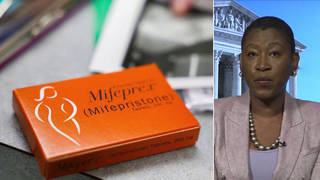





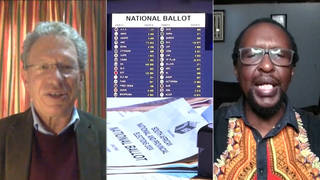
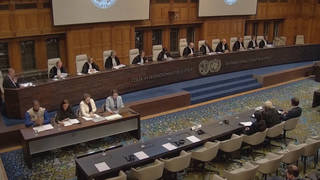

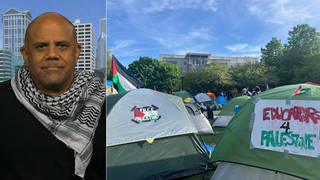
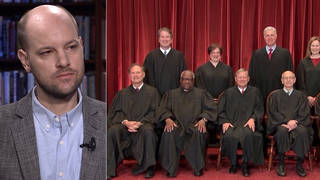
Media Options